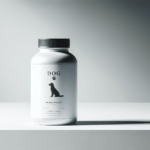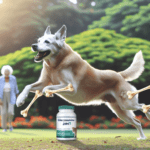
As a responsible dog owner, it’s essential to keep up with vital health checks to ensure your furry friend enjoys a long, happy, and healthy life. Regular veterinary visits, tailored to your dog’s specific breed and age, help monitor overall health, skin and coat condition, dental health, and joint mobility. High-quality dietary supplements, such as omega-3 fatty acids, glucosamine, and probiotics, can support your dog’s wellness by maintaining healthy skin, joints, and digestion. Additionally, routine vaccinations and dental cleanings are crucial preventive measures. By prioritizing these health checks and collaborating with your vet, you provide the best care for your canine companion. Have you ever wondered if you’re taking all the necessary steps to ensure your dog’s health and well-being? Being a responsible dog owner involves more than just providing love, food, and shelter. It requires attention to specific health checks and proactive measures that will help your furry friend live a longer, healthier life. Let’s dive into the key health checks every responsible dog owner should follow up on regularly.
Regular Veterinary Check-Ups
Regular check-ups with a trusted veterinarian are fundamental to your dog’s health. These visits allow for early detection of potential health issues and ensure that you’re on the right track when it comes to your dog’s overall well-being.
Annual and Semi-Annual Exams
Adult dogs should visit the vet at least once a year. Older dogs or those with specific health concerns might need more frequent check-ups, typically twice a year or as advised by your vet. These exams cover a full physical check, weight and diet evaluation, and discussion of any behavioral changes.
Vaccinations
Vaccinations protect your dog from potentially fatal diseases like parvovirus, distemper, and rabies. Your veterinarian will provide a vaccination schedule tailored to your dog’s age, breed, and health status, ensuring that your pet is up to date with necessary shots.
Dental Health
Your dog’s dental health is crucially linked to its overall health. Poor dental hygiene can lead to periodontal disease, which can have serious consequences not just for the mouth but for the entire body.
Regular Teeth Cleaning
Brushing your dog’s teeth daily is ideal, but even a few times a week can make a significant difference. Special toothbrushes and toothpaste designed for dogs are available in the market.
Professional Dental Cleanings
Veterinary dental cleanings may be necessary to thoroughly remove plaque and tartar that home brushing can’t reach. These should be done annually or as often as your vet recommends.

Proper Nutrition
It’s essential to feed your dog a balanced and nutritious diet that supports their overall health. This includes providing the right mix of proteins, fats, carbohydrates, vitamins, and minerals.
High-Quality Dog Food
Opt for high-quality dog food that meets the nutritional standards set by associations like the American Association of Feed Control Officials (AAFCO). Your vet might recommend specific brands or formulations based on your dog’s health needs.
Supplements
In addition to a balanced diet, some dogs might benefit from supplements. These can include:
- Omega-3 Fatty Acids: Support healthy skin and coat
- Glucosamine and Chondroitin: Promote joint health
- Probiotics: Improve digestion
- Multivitamins: Ensure all essential nutrients are consumed
Weight Management
Keeping your dog at a healthy weight is critical to their overall health and can prevent many common health issues.
Regular Weigh-Ins
Regular weigh-ins can help ensure your dog is maintaining a healthy weight. Your vet can provide a target weight range based on your dog’s age, breed, and health.
Portion Control
Feed your dog measured portions of food rather than free-feeding. Ask your vet for guidance on the correct serving sizes.

Exercise
Exercise is just as important for dogs as it is for humans. It helps maintain a healthy weight and provides mental stimulation.
Daily Activities
Ensure your dog gets daily exercise, which could include walks, playtime, or more strenuous activities depending on their breed and health status.
Special Considerations
Adjust exercise requirements based on your dog’s age and physical condition. Senior dogs or those with joint issues may require lower-impact activities.
Joint Health
Joint health is especially important as your dog ages. Conditions like arthritis can severely impact your dog’s quality of life.
Joint Supplements
Supplements containing glucosamine, chondroitin, and omega-3 fatty acids can support joint health and help manage symptoms of arthritis.
Physical Therapy
Physical therapy or hydrotherapy can be beneficial for dogs experiencing joint pain or mobility issues. Your vet can recommend appropriate therapies.

Skin and Coat Health
A shiny coat and healthy skin are signs of a well-nourished and healthy dog. Skin and coat issues can be indicators of underlying health problems.
Regular Grooming
Regular grooming helps maintain your dog’s skin and coat while allowing you to check for abnormalities like lumps, bumps, or parasites.
Diet and Supplements
A balanced diet rich in omega-3 fatty acids can help maintain healthy skin and a shiny coat. Ask your vet about suitable supplements.
Parasite Prevention
Parasites like fleas, ticks, and worms can cause severe health issues if not managed properly.
Flea and Tick Control
Use veterinarian-recommended flea and tick preventatives to protect your dog from infestations and the diseases they can carry.
Regular Deworming
Regular deworming is essential to prevent internal parasites. Your vet will recommend a suitable schedule based on your dog’s lifestyle and needs.
Regular Blood Work
Regular blood tests can help spot potential health issues before they become serious.
Baseline Tests
Establish a baseline for your dog’s health with comprehensive blood work when they are young or first adopted. This will help identify any anomalies in future tests.
Ongoing Monitoring
Especially as your dog ages, regular blood work can help monitor for conditions like liver disease, kidney disease, and diabetes.
Senior Dog Health Checks
Older dogs require more frequent and specialized health checks. Aging brings about different health challenges that need proactive management.
Mobility and Pain Management
Older dogs often suffer from arthritis and other joint issues. Regular monitoring and pain management are crucial to maintain quality of life.
Cognitive Health
Senior dogs can experience cognitive decline. Look out for changes in behavior and consult your vet for potential interventions like diet changes or supplements.
Behavioral Health
Your dog’s mental and emotional health is just as important as their physical health.
Socialization
Regular socialization with other dogs and people can reduce anxiety and behavioral issues.
Mental Stimulation
Provide toys, puzzles, and other forms of mental stimulation to keep your dog mentally active and happy.
Conclusion
Being a responsible dog owner involves regular check-ups, proper nutrition, regular exercise, and parasite prevention among other health checks. By proactively managing these aspects, you’ll help ensure that your beloved canine companion lives a long, healthy, and happy life. Always consult with your veterinarian for personalized advice tailored to your dog’s specific needs.







